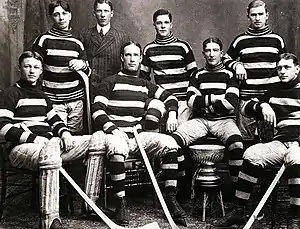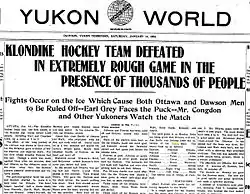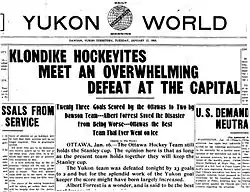1904–05 Ottawa Hockey Club season
The 1904–05 Ottawa Hockey Club season, the club's 20th season of play, lasted from January 7, 1905, until March 11, 1905. Ottawa won the league championship of the Federal Amateur Hockey League and successfully defended its Stanley Cup championship against all challengers.
| 1904–05 Ottawa Hockey Club | |
|---|---|
Stanley Cup champions | |
| League | 1st FAHL |
| 1904–05 record | 7–1–0 |
| Team information | |
| General manager | Bob Shillington |
| Coach | Alf Smith |
| Captain | Harvey Pulford |
| Arena | Dey's Arena |
| Team leaders | |
| Goals | Frank McGee (17) |
| Goals against average | Dave Finnie (2.4) |
Off-season
After resigning from the Canadian Amateur Hockey League (CAHL) in January 1904, the club made plans to join the FAHL. However, before the season started, the club investigated returning to the CAHL and to helping create a merger of the FAHL with the CAHL. The teams of the CAHL were opposed to both initiatives and the club played the season in the FAHL.[1]
Two personal tragedies occurred during the off-season. Jim McGee died in a horse-riding accident in May. The McGee family did not wish Frank to continue to play hockey with only one good eye but Frank chose to play the season. Harvey Pulford's wife Annis died giving birth to a son in December 1904.[2]
In December 1904, the Ottawas signed an agreement to return to Dey's Rink for season and Stanley Cup play.[3] The Ottawas had been unhappy with the Aberdeen Pavilion and the Dey's Rink management agreed to arena improvement.
Bouse Hutton was ruled ineligible by the Canadian Amateur Athletic Union (CAAU) to play amateur ice hockey. He had played with the Ottawa Capitals Lacrosse Club, which was ruled to be a professional team.[4] In addition, he had a severe case of quinsy.[5] Hutton retired from ice hockey, continuing in lacrosse. Dave Finnie took his place.
Harry Westwick who also had played lacrosse, was deemed eligible by the CAAU to play ice hockey for Ottawa, but was considered a professional by the Ontario Hockey Association (OHA). This meant the cancellation of an exhibition between the Toronto Marlboros and Ottawa prior to the season as Ottawa refused to play without Westwick. The Dey's Rink still charged the Marlboros for rental of the rink.[6]
Suddy Gilmour did not return for this season, as he went to work lumbering in the Gatineaus.[7]
Regular season
The Club won the league championship with a record of seven wins and one loss. The first game, on January 7 versus the Wanderers, was attended by Albert Grey, 4th Earl Grey, the Governor-General of Canada. Grey dropped the puck for the first face-off. It was the first display of ice hockey that he attended.[8]
Highlights
Frank McGee scored five goals against the Montagnards on February 4.
Final standing
| Team | Games Played | Wins | Losses | Ties | Goals For | Goals Against |
|---|---|---|---|---|---|---|
| Ottawa Hockey Club | 8 |
7 |
1 |
0 |
60 |
19 |
| Montreal Wanderers | 8 |
6 |
2 |
0 |
44 |
27 |
| Brockville | 8 |
4 |
4 |
0 |
34 |
30 |
| Cornwall HC | 8 |
3 |
5 |
0 |
18 |
37 |
| Montreal Montagnards | 8 |
0 |
8 |
0 |
19 |
62 |
Results
| Month | Day | Visitor | Score | Home | Score |
|---|---|---|---|---|---|
| Jan. | 7 | Wanderers | 3 | Ottawa | 9 |
| 23 | Ottawa | 3 | Brockville | 5 | |
| Feb. | 1 | Ottawa | 7 | Cornwall | 2 |
| 4 | Montagnards | 4 | Ottawa | 14 | |
| 8 | Brockville | 0 | Ottawa | 7 | |
| 11 | Ottawa | 4 | Wanderers | 2 | |
| 24 | Cornwall | 0 | Ottawa | 9 | |
| Mar. | 3 | Ottawa | 7 | Montagnards | 3 |
Goaltending averages
| Name | Club | GP | GA | SO | Avg. |
|---|---|---|---|---|---|
| Finnie, Dave | Ottawa | 8 | 19 | 2 | 2.4 |
Scoring
| Name | GP | G |
|---|---|---|
| Frank McGee | 6 | 17 |
| Rat Westwick | 8 | 15 |
| Alf Smith | 8 | 13 |
| Hamby Shore | 3 | 6 |
| Angus Allen | 5 | 4 |
| Horace Gaul | 1 | 2 |
| Harvey Pulford | 6 | 1 |
| Arthur Moore | 8 | 1 |
| Billy Gilmour | 1 | 0 |
| Fred White | 2 | 0 |
An "own goal", by Garnet McDonald of Cornwall, in the February 24, 1905 game was also recorded for Ottawa. After a shot by Hamby Shore was stopped, McDonald "in a zealous effort to clear, only batted it in."[9]
Stanley Cup challenges
Ottawa vs. Dawson City
The first interest in a challenge from Dawson City was indicated in a letter from Weldy Young to the Ottawa Citizen, in 1900. The Stanley Cup trustees received a letter from G. T. Kirkson and C. Shannon of Dawson on June 7, 1901, challenging the then-champion Winnipeg Victorias. After P. D. Ross wrote back to Dawson, nothing further was heard from the Dawson club until September 9, 1904, when Ross received a challenge from Young for a Dawson City All-Star team to challenge the Silver Seven. Ross authorized the challenge in December 1904.[10]
In January 1905, the Dawson City Nuggets travelled 4,000 miles (6,400 km) from the Yukon to Ottawa for a best-of-three Cup challenge series. The Nuggets actually left Dawson City on December 19, 1904, and travelled on a month-long journey by dog sled (Dawson to Whitehorse), ship (Skagway to Vancouver), and train (Whitehorse to Skagway, and Vancouver to Ottawa). They were no match for the Silver Seven. Ottawa defeated them in the first game, 9–2. Numerous Stanley Cup records were then set in game two, including Frank McGee's 14 goals, which included eight consecutive goals scored in less than nine minutes,[11] and a 23–2 rout, the largest margin of victory for any challenge game or Stanley Cup Final game to date.
Several players playing for Dawson were from the Ottawa area. Jim Johnstone was from Ottawa. Norman Watt was from Aylmer, Quebec. Randy McLennan was from Glengarry County, Ontario[12] and had played in a Stanley Cup challenge for Queen's University of Kingston, Ontario. Another player had Stanley Cup challenge experience: Lorne Hanna, "formerly of the Yukon", had played for Brandon Wheat City in their 1904 challenge of Ottawa.[13]
| Date | Winning Team | Score | Losing Team | Location |
|---|---|---|---|---|
| January 13, 1905 | Ottawa HC | 9–2 | Dawson City Nuggets | Dey's Arena |
| January 16, 1905 | Ottawa HC | 23–2 | Dawson City Nuggets | |
| Ottawa wins best-of-three series 2 games to 0 | ||||
Game one
|
|
| |||||||||||||||||||||||||||||||||||||||||||||||||||
Sources:
Game two
|
Source: Coleman[14] |
| ||||||||||||||||||||||||||||||||||||||||||||||||||
Sources:
After the series, Ottawa held a banquet for Dawson City at the Ottawa Amateur Athletic Association (OAAA) clubhouse. There is a Stanley Cup legend that after the banquet, the Stanley Cup was drop kicked into the frozen Rideau Canal nearby and retrieved the next day. However, Bill Westwick, Ottawa Journal sports editor and the son of Silver Seven player Rat Westwick, and NHL commissioner Frank Calder both deny it ever happened.[18]
Ottawa vs. Rat Portage
In March 1905, the Rat Portage Thistles issued another challenge to the Senators. McGee did not play in the first game and the Thistles crushed Ottawa, 9–3. However, he returned to lead the Senators to 4–2 and 5–4 victories in games two and three, respectively. McGee returned in game two, with his good forearm wrapped in a cast, and only a light bandage on his broken wrist, to decoy the Thistles. Alf Smith scored three goals in game two on slow ice, which the Thistles claimed was salted to slow down the Thistles. There was hard ice in game three, and the lead exchanged hands several times. The Thistles led 2–1 at halftime and 3–2 midway through the second half. Ottawa took a 4–3 lead, before Tommy Phillips scored his third of the game to tie the score. However, McGee came through with the winning score late in the game to win it for Ottawa.[10] Nearly 11,000 attended the series, and sell-outs left spectators outside of Dey's Arena.[19]
| Date | Winning Team | Score | Losing Team | Location |
|---|---|---|---|---|
| March 7, 1905 | Rat Portage Thistles | 9–3 | Ottawa HC | Dey's Arena |
| March 9, 1905 | Ottawa HC | 4–2 | Rat Portage Thistles | |
| March 11, 1905 | Ottawa HC | 5–4 | Rat Portage Thistles | |
| Ottawa wins best-of-three series two games to one | ||||
Game one
Ottawa played game one without two of its top players: Frank McGee and Billy Gilmour. In the Montreal Gazette report, the Thistles' speed was praised, saying that "once one of the Thistle players had broken away he was hardly in any danger of being caught by an Ottawa forward." Rat Portage scored first but Ottawa scored twice to gain the lead. Si Griffis then scored three consecutive goals to put the Thistles ahead 4–2 at the half. In the second half, the Thistles continued their dominance, scoring four straight before Ottawa replied. Phillips scored his final goal to make it 9–3 for the Thistles. The game was played with two referees and the game was described as the "cleanest game played in Ottawa this season."[20]
Referee: Hartland McDougall, (asst: R. McDougall) Goal umpires: T. Wall, R. Meldrum and Eddie Phillips |
Source: Montreal Gazette[20] | |||||||||||||||||||||||||||||||||||||||||||||||||||||||||||||||||||||
Game two
The second game was played on heavy, wet, ice. This was considered a disadvantage to the Thistles, who were unable to play their style of game, having only skates suited to fast ice. Bolstered by the return of McGee and Gilmour, Ottawa played a game of "trickery and rough tactics" that they were known for. Griffis opened the scoring at 16 minutes of the first half. A minute later, Smith responded, tying the score. Hooper scored for Rat Portage two minutes later to put the Thistles again into the lead, but this was countered by two goals from Ottawa's Smith and Gilmour to put Ottawa ahead 3–2 at the half. In the second half, only Ottawa was able to score, as Ottawa's Smith completed his hat trick at 18:45 to cement the game for Ottawa. McGee did not score, but did his part to intimidate the Thistles with stick work, drawing four penalties. Dey's Rink was jammed, filled with 3,500 spectators, leaving approximately 1,000 outside on Gladstone Avenue.[21]
Referee: Mr. M Grant Goal umpires: Eddie Phillips, George Murphy |
Source: Montreal Gazette[21] | |||||||||||||||||||||||||||||||||||||||||||||||||||
Game three
The third game was played on hard, fast ice unlike game two. McGee came to the fore in scoring, scoring a hat trick, including the game and Cup winner with two minutes to play. In the first half, Phillips of Rat Portage scored twice to put the Thistles ahead 2–1 at the half. Smith of Ottawa opened the scoring in the second, matched by Hooper eight minutes later. McGee and Westwick scored to put Ottawa ahead 4–3 but Phillips tied it at 4 with four minutes to play. McGee won the game with his third goal, converting a pass from Pulford with two and a half minutes to go. The Montreal Gazette report praised the quality of the game and Harvey Pulford in particular.[22]
Referee: Mr. M Grant Judge of Play: Shirley Davidson Goal umpires: William Foran, Eddie Phillips |
Source: Montreal Gazette[22] | ||||||||||||||||||||||||||||||||||||||||||||||||||||||||||||
Ottawa Hockey Club 1905 Stanley Cup champions

Players
- Horace Gaul
- Hamilton "Billy" Gilmour
- D. McErnie†
- Hamby Shore
- Fred White
- Alf Smith (playing-coach)
- Harvey Pulford (Point-Captain)
- Arthur Moore (cover point)
- Angus “Bones” Allen (point)
† Substitute/on team picture/dressed, but did not play &-Missing from the team picture.
Coaching and administrative staff
- G.P. Murphy (President), Robert Shillington (manager)
- Patrick Baskerville (treasurer), Thomas D'Arcy McGee (secretary)
- Halder Kirby (club doctor), David Barred (team dentist)
- Llewellyn Bates, J.P. Dickson, Martin Rosenthal, Charles Sparks (directors)
- Pete Green (trainer), Mac MacGilton (ass't trainer)
Stanley Cup engraving
Weldy Young, a former member of the Ottawa team in the 1890s, and the captain of the Dawson City team, engraved his name on the Cup with a pen knife. He had missed playing for Dawson as he was working in the federal election, although he did arrive in Ottawa during the series.[23]
References
- Kitchen 2008, pp. 127–128.
- Kitchen 2008, pp. 140–141.
- "Will Play in Dey's". The Ottawa Journal. December 2, 1904. p. 2 – via newspapers.com.
- "Hutton's Case". The Ottawa Journal. December 23, 1904. p. 2 – via newspapers.com.
- "Ottawas Practice". The Ottawa Journal. December 21, 1904. p. 2 – via newspapers.com.
- "Marlboros' Predicament". The Ottawa Journal. December 30, 1904. p. 2 – via newspapers.com.
- "Gilmour is Gone". The Ottawa Journal. January 6, 1905. p. 2 – via newspapers.com.
- "Wanderers Lose; Ottawa Rejoices". Montreal Gazette. January 9, 1905. p. 4.
- "Ottawa 9, Cornwall 0". The Ottawa Journal. February 25, 1905. p. 15 – via newspapers.com.
- Zweig 2012, p. 301.
- "History of McGee's Inn: Frank McGee, the hockey legend". McGee's Inn Bed & Breakfast – Ottawa, Ontario, Canada, Website. Retrieved 16 May 2011.
- Kitchen 2008, p. 142.
- Davidson, Dan (March 7, 1997). "The Nuggets are off to Ottawa". Klondike Sun. Archived from the original on February 19, 2018. Retrieved February 9, 2021.
- Coleman 1966, p. 112.
- "none". The Globe. January 14, 1905. p. 21.
- Fischler & Resnick 1990, p. 261.
- "none". The Globe. January 17, 1905. p. 12.
- Zweig, Eric (June 3, 2017). "How the Stanley Cup Wound Up in a Canal, or Didn't". The New York Times.
- "Echoes of the Games". The Montreal Gazette. March 12, 1905. p. 12.
- "Rat Portage Won". The Montreal Gazette. March 8, 1905. p. 2.
- "Second For Ottawa". The Montreal Gazette. March 10, 1905. p. 2.
- "Stanley Cup Stays". The Montreal Gazette. March 12, 1905. p. 2.
- Shea & Wilson 2006, p. 430.
- Coleman, Charles L. (1966). The Trail of the Stanley Cup, Vol. 1, 1893–1926 inc.
- Fischler, Stan; Resnick, Jeff (1990). Golden ice: the greatest teams in hockey history. McGraw-Hill Ryerson. ISBN 0075499630.
- Kitchen, Paul (2008). Win, Tie or Wrangle: The Inside Story of the Old Ottawa Senators – 1883–1935. Manotick, Ontario: Penumbra Press. ISBN 978-1-897323-46-5.
- Podnieks, Andrew (2004). Lord Stanley's Cup. Triumph Books. ISBN 1-55168-261-3.
- Shea, Kevin; Wilson, John Jason (2006). Lord Stanley: The Man Behind the Cup. Fenn Publishing Company, Ltd. ISBN 1-55168-281-8.
- Zweig, Eric (2012). Stanley Cup: 120 years of hockey supremacy. Firefly Books. ISBN 978-1-77085-104-7.

